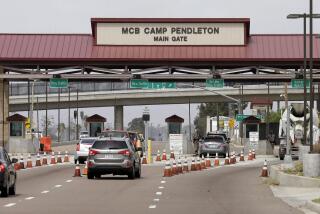Where Navy Families Are at Ease, Off Base : Camarillo: Military personnel from Port Hueneme and Point Mugu get a taste of cloistered suburbia in a unique housing complex.
- Share via
They come from U. S. Navy bases and ships scattered all over the planet.
They stay for maybe three years and then go--packing up their families, their sea bags and the few precious belongings they own.
But while stationed in Ventura County, Navy personnel and their families who are assigned shelter in a unique housing complex in Camarillo also get a slice of middle-class civilian life in suburbia.
Anchored on the western side of Camarillo, just a few blocks off the Ventura Freeway and seven miles from the nearest base, Catalina Heights is home to about 1,100 Navy personnel from the Construction Battalion Center at Port Hueneme and the Point Mugu Naval Air Station.
Civilian visitors driving into the compound sense that something about the place is different. But they often don’t know that they have driven onto an extension of a Navy base.
On most of the streets, large signs remind drivers that children are at play and to slow down accordingly. Block after block, the standard-issue beige, brown and off-white color scheme covers rows of single-family homes and two-story townhouse apartments--some in noticeably better shape than others.
At nearly every corner, children with their mothers in tow play on the many grassy areas that stripe the nine-block, 315-unit complex.
At the community center, run by the Navy’s Morale, Welfare and Recreation Division, a petty officer with time on his hands borrowed a communal mower and a pair of garden shears from the center to cut his slightly overgrown lawn.
And, although it is not a federal holiday, vibrant American flags fly nearly everywhere one looks. Beside them, handmade signs welcoming home long-missed sailors hang in doorways, porches and carports.
Nearby, under a lazy afternoon sun, spouses chatted about the many things Navy families have in common--such as the loneliness brought on by the absence of a husband or wife and the nagging fear that the next time a loved one walks out the door might be the last time he or she is ever seen.
Residents suspect that the sharing of concerns that has created an extended family here can’t be found in any civilian neighborhood nearby.
“If my neighbor hears a suspicious sound or her car breaks down, she knows that she can feel free to call us,” said Perry Merritt, wife of Lt. Clark Merritt, a test squadron maintenance officer at Point Mugu. “And that same kind of thing works for me when Clark’s away. It’s a nice feeling.”
This support network, neighborhood residents say, is why they stay pretty much to themselves.
“It’s not that we don’t like the folks living outside; it’s just that people who are not in the Navy have a hard time understanding what our spouses go through when we’re gone,” said Frank Petruzzi, 35, a petty officer and aircraft mechanic at Point Mugu.
Petruzzi, his wife, Leatha, also 35, and their three boys, ages 9, 11 and 14, like living in their Camarillo house after living on base for much of his 13 1/2-year career. They have lived at Catalina Heights for almost three years.
“For security reasons, I liked living on base, but a lot of people who live on base never feel like they leave work,” Leatha Petruzzi said. “Being out here gives Frank a nice break from work.”
The housing compound was acquired by the Navy in 1975 after the Air Force closed what was then Oxnard Air Force Base.
Shortly after the closure, the base was turned over to the county, which renamed it Camarillo Airport.
The housing facility, originally named Capehart, now serves as a critical link in the Navy’s housing network in Ventura County, said Capt. Tom Boothe, a public works officer who oversees Navy housing.
Boothe said that currently, Navy personnel must endure up to 18-month waiting lists for Navy-subsidized housing. Personnel not lucky enough to secure the rent-free digs are given a housing allowance to get a place to live outside Navy facilities.
In 1992, Boothe said, the Navy completed the first phase of renovation on Catalina Heights interiors, including the installation of new plumbing, hardwood floors, new kitchens and appliances. He said that this year, the Navy would focus on renovating the exteriors, community center and playground areas.
The Navy, which will spend $1.9 million on renovation at Catalina Heights this year, will make nearly 400 new on-base housing units available at Port Hueneme and Point Mugu by the end of April to meet demand.
“The quality-of-life factor is something we are very concerned about,” Boothe said. “We want people to take pride in where they live. We want them to have a sense of ownership of the unit they’re occupying.”
At Catalina Heights, residents say they enjoy the nearly self-contained environment--replete with a community center and military version of a convenience store. Their trash is picked up by the Navy, as is the cost of their utilities. The county provides police and fire services.
“One of the nice things about housing here is that once you’re here, you have everything you need,” said Marge Hays, wife of Seabee Petty Officer Brooks Hays. “The Navy runs the community center and a mini-mart. Even though you have all the advantages of the civilian world around you, everything’s right here.”
At the community center, residents can receive free preschool and day-care services for their children. Currently under renovation, the center, which sits in the middle of a park inside the neighborhood, serves about 70 children a day, according to Yvette Collins, the facility’s director.
Collins said one of the center’s missions is to support Navy families, many of whom become de facto one-parent families when spouses are away at sea.
“It’s not uncommon to have one spouse at sea and one spouse working full time,” Collins said. “Those are the kinds of situations where we come in. We make sure that the kid is where he or she should be and that everything’s OK. We provide a level of security for the working parent that they can depend upon.”
But being part of a Navy family means that separation from a loved one is a hard fact of life, Leatha Petruzzi said.
“You start by being honest with your kids,” she said. “You tell them that while their daddy or mommy is gone, they’re going to have to handle more responsibility. Basically, you get them involved. If you do that, the pain of the absence doesn’t hurt quite as much.”
More to Read
Sign up for Essential California
The most important California stories and recommendations in your inbox every morning.
You may occasionally receive promotional content from the Los Angeles Times.













